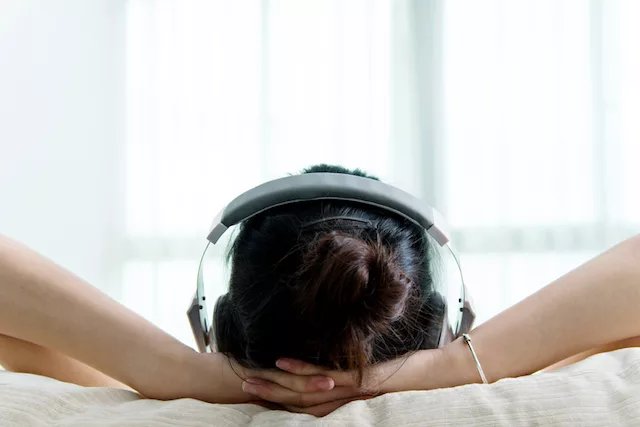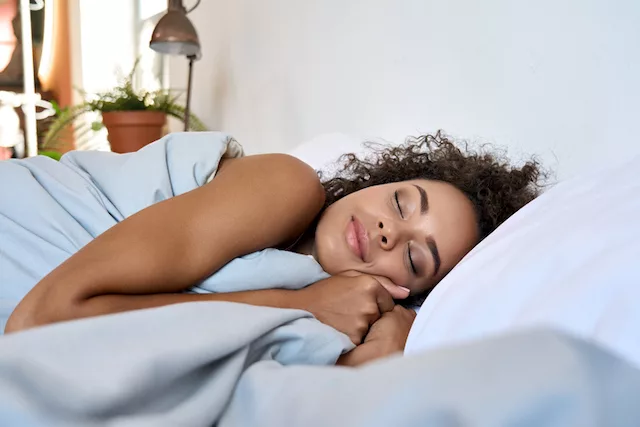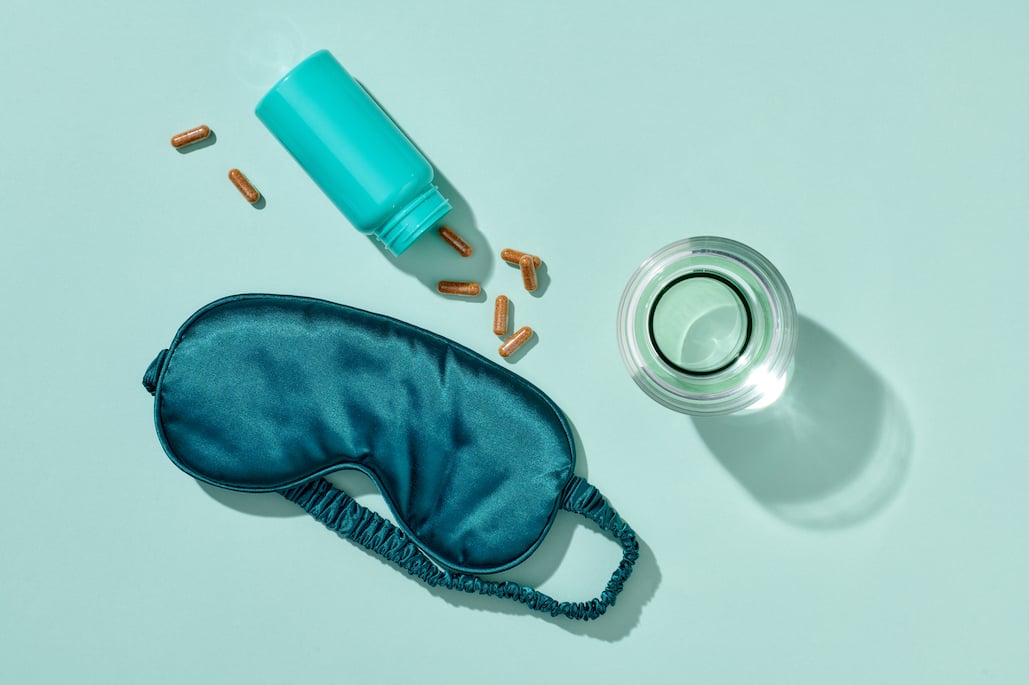Table of Contents
We don’t have to tell you twice that getting enough sleep is essential for your ability to focus, function and feel your best. However, if you’re like most people, achieving the recommended amount of sleep on a regular basis isn’t always easy. There are plenty of obstacles that get in the way. Fortunately, there are also actions you can take to help set yourself up for a better night’s rest.
“Sleep fitness” refers to a holistic approach to optimizing your sleep. It takes into account the importance of creating consistent habits that help support rest and overall well-being.
The Basics of Sleep Health
The idea of sleep training is often reserved for infants and toddlers, but the truth is that even adults can regress in their sleep patterns from time to time. Sometimes the best way to get back on track is to be intentional about incorporating habitual sleep-promoting practices.
The fundamental elements of a healthier sleep routine include a consistent sleep schedule, a comfortable sleep environment, and optimal sleep duration.
How do you accomplish these things? Well, it starts with reflecting on your current habits and identifying where and how you can make improvements.
Let’s take a closer look at the habits to embrace and the habits to ditch in order to optimize your sleep fitness. We’ve consulted with sleep expert and Board Certified Behavior Analyst® Charlsie Myers, PhD for some of the best actionable tips you can try right away.
The Habits to Embrace
If you’re in the market for better sleep, consider the following healthy habits to incorporate into your nightly routine.
Consistent Sleep Schedule
Going to bed and waking up at the same time every day — yes, even on the weekends — is a good first step to improving your sleep. This can take some practice if your sleep pattern has been erratic.
You can train your body and brain to prepare for bed and wake up around the same time so that eventually it’s running on autopilot. A consistent sleep schedule is foundational in regulating your circadian rhythms.
Creating a Relaxing Bedtime Routine
There’s a reason we all have a bedtime routine of sorts. Most days, it’s unrealistic to expect to just jump into bed and fall asleep with no real preparation. Ideally, give yourself at least 30 minutes before trying to go to sleep to start calming your body and quieting your mind.
If you have trouble relaxing before you go to bed, some activities that may help include:
- Gentle stretching or yoga poses
- Journaling
- Drawing
- Reading
- Listening to a podcast or soft music
Myers also recommends carving out time for a bath sometimes “Having a warm bath or shower 1-2 hours before bedtime promotes a rise in body temperature that helps you cool down, which is necessary for good sleep,” she says.
Optimal Sleep Environment
Nobody sleeps well in an uncomfortable place where they can’t relax. Considering the components you need for a good night’s rest is important, whether that means what you’re sleeping in, on, or the overall atmosphere of your bedroom.
Have you ever tried to sleep in a place that was too bright, noisy, or hot? These are all factors that can disrupt rest. Instead, aim for a dark, quiet, and cool room. Wear something light to sleep that won’t make you sweat.
Have soft layers on your bed that you can adjust to your liking. A comfortable mattress and pillows that help your neck and spine stay in alignment can help prevent waking up with soreness.
sleep Music and Sounds
Many people fall asleep to the television, but we would advise against doing this as it can interrupt your natural circadian rhythms. Other options are bedtime meditations, stories, sleep music, and sounds.
“Some of these are designed to bore you to sleep, while others are more about calming and relaxation. There are many great apps for this, and if your bed partner doesn’t wish to listen, you can get bed headphones or pillow speakers. Just be mindful you may need to restart this when you wake in the night if it becomes a sleep association,” says Myers.
If you do better with some type of noise in your bedroom, consider one of the following:

- White noise: The most popular of all the color noises, white noise encompasses an equal amount of all frequencies across the spectrum of sound. Examples include the humming of a vacuum, static from a TV or radio, or the whirring of a fan. You can even buy a white noise machine. Research on white noise and sleep shows mixed results, but many people swear by it as it helps drown out other disruptive noises.
- Pink noise: This also contains the full range of sound but with an emphasis on lower frequencies that drown out higher frequencies. Many people who find white noise obnoxious prefer pink noise. Research has shown that pink noise can significantly reduce brain wave complexity and promote more stable sleep.
- Music: A 2022 Cochrane review found that listening to music daily can be effective for improving sleep among people with insomnia. Other studies agree that music can increase comfort and reduce anxiety that may be getting in the way of sleep for the general population. No, this doesn’t mean any music. Go for a genre that is calming, soft, and soothing, like instrumental. Incorporate sleep music into your nighttime routine as you wind down for the day.
Limiting Screen Time
We live in a screen-heavy society and there’s little that many can do about it when it comes to career demands. However, turning the screens off as you get closer to the end of the day has been shown to support better sleep.
Why? The blue light that’s emitted from technology, whether it’s our phone, tablet, laptop, or TV, interrupts your natural circadian rhythms. In fact, while blue light can serve wakefulness purposes during the day, it inhibits the normal release of melatonin that prepares you for bed as the day comes to an end.
Ideally, aim to set aside your screens at least one hour before bedtime.
The Habits to Ditch
We all do things on a daily basis that we may not realize are preventing us from getting a good night’s rest. We’ve listed some common sleep disruptors and bad habits that are best avoided when your goal is better sleep.

Excessive Caffeine and Alcohol
Caffeine is a stimulant, which is why so many of us enjoy it as part of our morning routine. However, when consumed in excess or too close to bedtime, caffeine keeps your brain awake, making it harder to fall asleep.
Alcohol, on the other hand, depresses your central nervous system. While it may help you drift off at first, it’s known to interrupt phases of sleep later in the night. This often results in waking up more frequently and reduced overall restfulness.
Limit your consumption of both, especially in the evening. Alternatively, opt for decaffeinated coffee or tea and non-alcoholic beverages. If you enjoy a soothing beverage before bed, consider a glass of warmed milk or herbal tea instead.
Irregular Sleep Patterns
If you’ve become accustomed to an irregular sleep pattern, more consistency here will make a significant difference in your rest. Getting solid, regular sleep is crucial for your mood, brain performance, and overall health. Not to mention, inconsistent sleep patterns are associated with a higher risk of disease over time.
Start by setting yourself an alarm that indicates when it’s time to start winding down for bed. This can be your signal that it’s time to turn off screens and do something calming to prepare your brain for rest.
Set an alarm in the morning as well. Follow this pattern daily, even on the weekends. Eventually, your body will naturally start to get tired (and wake up) around the same time on its own.
Late-Night Heavy Meals
We’ve all been ravenous late at night before, but this is often because we didn’t eat enough earlier in the day. As soon as you finish a big meal to satisfy an intense hunger, it’s common to feel stuffed, bloated, and uncomfortable until your body digests everything.
Needless to say, this isn’t exactly a relaxing way to prepare for bedtime. Just as being hungry makes it hard to fall asleep, so does being overstuffed. Late-night eating may even increase your risk for obesity and type 2 diabetes.
If you need something between dinner and bedtime, try to eat it at least 1-2 hours before you lie down. Choose a lighter meal or snack that pairs some protein, complex carbs, and healthy fats to keep you satisfied until morning.
Myers recommends including foods shown to help support sleep. For instance, kiwis, red grapes, tart cherry juice, nuts, bananas, beans, whole grains, barley grass, and fatty fish.
Elevating Your Nighttime Routine
Now that we’ve covered all the do’s and don’ts of your bedtime habits, you may be wondering whether there’s anything else that can help take your nighttime routine to the next level. And you’re in luck! Here are a few additional tips to ensure that your sleep game is on point.
Mindfulness and Meditation
Mindfulness is the practice of bringing attention to your presence in the moment. It’s an excellent tool for training your mind to ignore distractions and be fully aware of yourself. Practice mindfulness as part of your bedtime and wake-up routines.
Many people like to pair mindfulness with meditation. To start a mindful meditation practice, designate yourself a time and place to do it. Even 5-10 minutes a day, at bedtime and when you’re waking up for the day, can help support your sleep pattern. Find a comfortable position, focus on your breath, and try to get out of your head.
Sleep-Enhancing Supplements
Many people find it helpful to add certain supplements to their bedtime routine. Some of the most popular ones include melatonin, magnesium, cannabidiol (CBD), and herbal teas like chamomile.
Looking for a combination or multipurpose product? Mighty Night™ was formulated to help support healthy skin texture and tone, promote optimal sleep, and support cell turnover.
Before adding any new supplement, consult with your healthcare provider to make sure that it’s safe and appropriate for you to do so.
Tracking Sleep Patterns
Just as there are apps to track your fitness and steps during the day, there are apps to help you see what’s going on while you’re asleep. The data it tracks can help you visualize patterns and identify whether certain factors are contributing to or detracting from your sleep.
If you’d rather not use an app for this, you might opt for a journal instead. Journaling can be used as part of your bedtime routine to help empty your brain before falling asleep. It can also be helpful in the morning, to make notes about how you slept, how you feel when you wake up, and whether you added or removed anything new from your sleep fitness regimen.
Sleep Support Products
It’s amazing what a difference a little more self-care at bedtime can make for your sleep. The combination of soothing textures and calming aromas can help your body and mind relax.
Myers says, “Aromatherapy through an oil diffuser can be a good way to set calming cues for bedtime. Lavender, chamomile, and many other essential oils are associated with calmness and relaxation, which can promote sleep.”
NEOM Organics makes a wonderful line of products designed to support better sleep. For instance, their NEOM Scent to Sleep™ products are 100% natural, smell incredible (hello, lavender, chamomile, and jasmine), and may be just what you need to drift off to dreamland. Find your perfect candle, mist, oil, diffuser, or body care product here.

Your Sleep is Personal
Sleep is essential, Not getting enough negatively affects your quality of life, ability to function, and overall health. Unfortunately, countless obstacles and distractions can derail a good night’s rest over and over again.
Improving your sleep requires a holistic approach. Aiming for a consistent sleep-wake cycle, being more intentional with your bedtime routine, avoiding screens and heavy meals close to bedtime, and incorporating sleep-supportive products can all help.
If you’ve been struggling to feel rested, it’s time to take a close look at your sleep fitness. Try implementing some of the healthy sleep habits above and track your progress to see what’s working (and what’s not). Here’s to catching some more much-needed Z’s!
What sleep fitness hacks have worked for you? Share your tips and success stories on your social channels and be sure to tag us @humnutrition! For more insights on optimizing health and well-being, subscribe to our newsletter.





More Stories
Avocado Cacao Mousse – JSHealth
Janelle Brown on Garrison’s Mental Health Before His Death
How To Finally Beat Insomnia